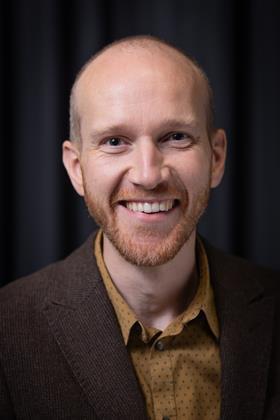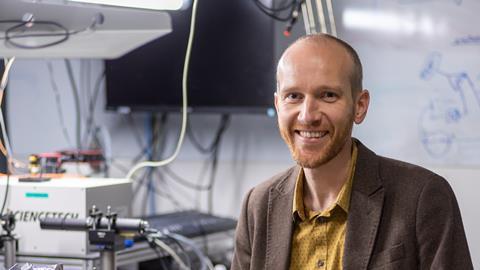Bruno Ehrler, head of the Hybrid Solar Cells group at research institute AMOLF in Amsterdam and professor at the University of Groningen is the recipient of the KNCV Gold Medal 2025; the most important Dutch scientific award for a chemist under the age of 40 who has already demonstrated scientific excellence and from whom much is expected in the coming years.
The jury, chaired by professor Katja Loos (University of Groningen) is impressed by his outstanding contributions to the physical chemistry of metal halide perovskites and his pioneering research at the interface of materials science, optoelectronics, and sustainable energy. His work stands out for its originality, clarity of purpose, and clear relevance to major technological and societal challenges. The KNCV Gold Medal 2025 will be awarded on 2 December during the NWO CHAINS chemistry conference in Veldhoven, The Netherlands.
Ion mobility

Bruno Ehrler has developed a leading research program focused on understanding and improving perovskite semiconductors—materials that combine excellent optoelectronic properties with ion mobility. He was one of the first to reveal how ionic migration within these materials affects device performance and stability, introducing spectroscopic and simulation tools that are now widely adopted. His discovery that mechanical strain can be used to control ion mobility has led to new approaches for designing stable perovskite solar cells, influencing both academic research and industrial strategies.
Synapse
In addition to his contributions to photovoltaics, Ehrler has broadened the scope of perovskite research by exploring their use in neuromorphic computing. His group has demonstrated artificial synapses and neurons with extremely low energy consumption, positioning these materials as promising building blocks for next-generation electronics. This work exemplifies the transboundary nature of his research and reflects his ability to open new directions by linking insights from chemistry, physics, and engineering.
Ehrler’s research output is highly respected in the international community, with a consistent stream of publications in leading journals and a large number of invited presentations. He has received significant recognition for his work, including an ERC Starting Grant, a NWO Vidi grant, and the ACS Energy Lectureship Award. Beyond the lab, he has played a prominent role in shaping Dutch national science policy. As one of the initiators of the SolarNL and MaterialenNL programs, he has helped secure large-scale public investment in sustainable materials and solar energy research in the Netherlands.
In summary, the jury praises the way in which Bruno Ehrler combines fundamental insight with a clear view toward application. His research has already shaped the field of perovskite photovoltaics, and his broader vision continues to inspire developments in energy and materials science.













Nog geen opmerkingen